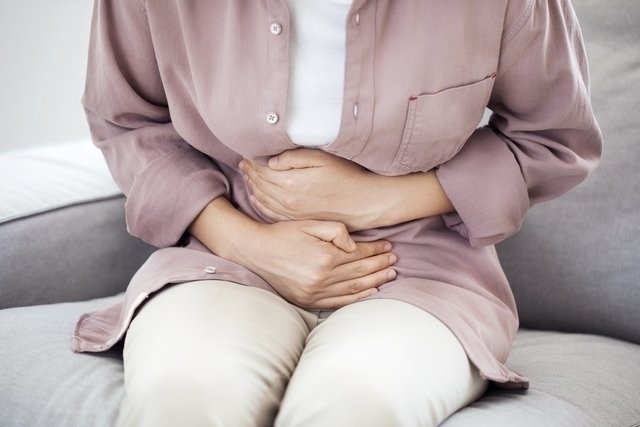Stomach cancer is a malignant tumor that can emerge in any part of the stomach. It usually starts as an ulcer that causes symptoms like constant heartburn, stomach pain, anemia and loss of appetite.
It is common for this type of cancer to not have any symptoms, which allows the tumor to grow gradually and only be caught in an advanced stage. Catching this type of cancer later on can make the chance of cure much lower.
Ideally, you should see a doctor if you have any stomach symptoms, especially if you have a family history of stomach cancer. You should see a gastroenterologist to evaluate your symptoms and order testing, like an endoscopy to identify any issues that require treatment.

Main symptoms
Most cancers develop without any obvious symptoms at first. Therefore, you should seek assessment if you have any of the following symptoms that are associated with stomach cancer, like:
- Constant heartburn
- Frequent stomach ache
- Nausea and vomiting
- Diarrhea or constipation
- The sensation of a full stomach after eating
- Weight loss
- Weakness and fatigue
- Vomiting with blood or blood in stools
These symptoms are non-specific and can be noted with other health conditions, like a stomach virus or a gastric ulcer. This is why you should see a doctor to identify the true underlying cause. The doctor may opt to order testing like an MRI or endoscopy.
Read more about the stomach cancer symtoms that you should not ignore.
Confirming a diagnosis
A stomach cancer diagnosis should be explored by a gastroenterologist. It is usually done with cancer blood tests and endoscopy with biopsy.
The doctor may also order other testing, like a CT scan, PET scan and/or an ultrasound to confirm a diagnosis and evaluate the cancer’s evolution. Results often help to guide treatment and next steps.
Possible causes
The exact cause of stomach cancer is not well understood, however it is commonly associated with the following health conditions:
- H. Pylori infection in the stomach
- Excessive intake of smoked foods and pickled foods
- The presence of a ulcer, or untreated chronic gastritis I
- Previous stomach surgeries
- History of pernicious anemia, hypochlorhydria or gastric atrophy
- Genetic predisposition (ie. a family history of stomach cancer or other cancers).
This disease is also more common in patients over 55 and is most seen in men.
Treatment options
Treatment for stomach cancer can be done with surgery, chemotherapy, radiation therapy, targeted therapy or immunotherapy. These depend on the stage of cancer and the patient’s general health status:
1. Surgery
Surgery for stomach cancer is a common treatment and is able to produce the best results for this type of cancer, particularly if it done in the cancer’s early stages. Surgery can be used to remove just the cancer, or even a part of the stomach along with the lymph nodes in the area.
Some surgical procedures that can be done include:
- Endoscopic mucosal resection: This is done in the early phases of the disease, in which the cancer is removed through endoscopy
- Partial gastrectomy: This consists of the removal of just part of the stomach, with the aim to conserve any healthy stomach tissue.
- Total gastrectomy: This consists of the total removal of the stomach, and is indicated when the cancer has affected the entire stomach or is located in the upper stomach.
With gastrectomy surgery, in addition to removal of part or the total stomach, the surgeon may also remove lymph nodes around the affected areas for further lab analysis. Removing lymph nodes helps to identify the presence of cancerous cells and define the extent to which the cancer as spread, which will ultimately help to guide treatment.
In addition, organs around the stomach, like the pancreas or spleen, may also be assessed for cancer and removed as necessary.
2. Chemotherapy
Chemotherapy for stomach cancer involves the use of medication to destroy cancer cells. They can be taken orally or administered through IV solutions. Many times, the doctor may prescribe a combination of medications to obtain best results.
Chemotherapy can be done prior to surgery, to help reduce the tumor size. It can also be done post-surgically, to help destroy cancer removed during surgery.
Some side effects of chemotherapy include:
- Nausea and vomiting
- Appetite loss
- Hair loss
- Diarrhea
- Mouth inflammation
- Anemia
Because it works on the entire body, chemotherapy may make the immune system more fragile and increase your risk for infection. Usually, side effects will subside a few days after the last chemo session.
3. Radiation therapy
Radiation therapy for stomach cancer uses targeted radiation waves to destroy, reduce or control cancer growth. Radiation can be done after surgery to destroy very small cancer cells that were not removed during surgery. It may also be used in combination with chemotherapy to prevent cancer from emerging again.
Side effects associated with radiation therapy include:
- Burns in the region receiving radiation rays
- Nausea and vomiting
- Diarrhea
- Body aches
- Anemia
Side effects of radiation therapy are more intense when it is done in combination with chemotherapy.
4. Immunotherapy
Immunotherapy consists of the use of medications that stimulate the immune system to attack cancerous cells. Immunotherapy can be done in conjunct with chemotherapy to help reduce the growth and spread of cancer.
Some side effects that may emerge include fever, weakness, nausea, vomiting, coughing and diarrhea.
